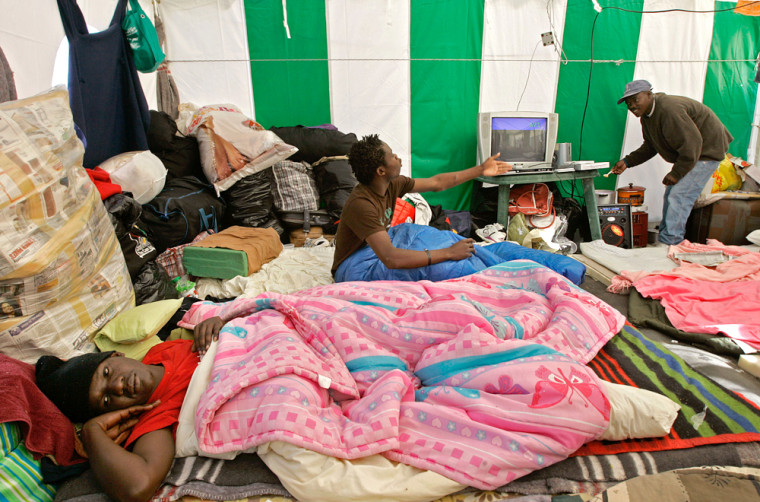City authorities vowed Tuesday to challenge a court order to move some 3,500 immigrants living in a camp near a popular tourist destination after they were forced from their homes in a wave of xenophobic violence.
The sprawling camp on a wind-swept beach near the Cape of Good Hope has come to symbolize South Africa's dilemma about what to do with the tens of thousands displaced by the attacks that erupted a month ago.
Cape Town's High Court ruled late Monday that the city must open community centers to house the displaced.
But authorities said moving the immigrants would risk exacerbating tensions with native South Africans, many of whom accuse the foreigners of "stealing" scarce jobs and services. The xenophobic attacks left at least 60 people dead.
"We want to reduce tensions, not increase them," said Robert Macdonald, spokesman for Cape Town.
Civil rights groups have charged that the "safe sites," such as the camp at a former picnic area at Soetwater, are like internment camps.
"The conditions there are so bad," said Patrick Chauke, the powerful head of a parliamentary Home Affairs committee. "The tents have been blown by the wind. There are women and children who are dumped there."
Thousands displaced
The camp includes nearly 2,000 Somali refugees. They say they are too afraid to return to the communities that chased them out and looted their stores, can't return to Somalia and want the U.N. refugee agency to move them to another country such as Australia or the United States.
U.N. representatives over the weekend said they couldn't be relocated, prompting the Somalis to threaten charity volunteers, trash food and begin a hunger strike. They also threatened to jump into the rough, icy waters and claimed that several had already committed suicide by drowning.
"The problem is that there is no ship that will take them anywhere," Chauke said in a parliamentary debate on Home Affairs policy.
Home Affairs Minister Nosiviwe Mapisa-Nqakula said that the xenophobic attacks, which killed at least 60 people, would scar South Africa's image for years to come.
"The real damage and after effects of these acts of criminality, committed in the name of our people, will still be felt in our country long after the tents have been dismantled, and way beyond the street patrols of police and soldiers in our communities," she said.
But critics said that her Home Affairs department, which is considered notoriously corrupt and has struggled to come up with a coherent immigration policy, should share the blame.
"So great are the problems in the department, so deep the malaise, so widespread the incompetence and lack of capacity, at times so depressing the sheer dysfunctionality, that it is almost impossible to start an objective assessment anywhere," said Mark Lowe of the opposition Democratic Alliance.
Lowe and other lawmakers — both from the opposition and the ruling African National Congress — said it was vital to reinstate the army on border patrol. It withdrew last year, but the police are too badly staffed and ill-equipped to fill the void.
Unknown number of foreigners
Mapisa-Nqakula admitted last week that her department had no idea how many foreigners currently live among South Africa's 48 million people, attracted by its relative prosperity, stability and long, porous border.
There are believed to be up to 3 million Zimbabweans who fled the economic meltdown and political repression at home. Many have no documentation and are routinely deported. Others wait desperately in line for papers from Home Affairs.
Conditions at the Cape Town office are particularly bad, with asylum seekers spending days and nights in line under a highway bridge for fear of losing their slot.
One Zimbabwean asylum seeker last year died — apparently of hunger and dehydration — while he was in the line.
Chauke said he was appalled.
"It's raining, it's cold, it's windy. There are women and children, young and old ... standing in the rain. Normally they would sleep on the floor, but it's wet and they are standing the whole night with plastic covering their body."
He said, "It's a challenge that needs all of us to resolve it. It gives a very bad picture of this country."
